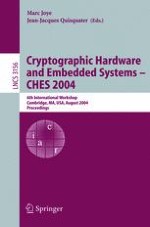2004 | OriginalPaper | Buchkapitel
Concurrent Error Detection Schemes for Involution Ciphers
verfasst von : Nikhil Joshi, Kaijie Wu, Ramesh Karri
Erschienen in: Cryptographic Hardware and Embedded Systems - CHES 2004
Verlag: Springer Berlin Heidelberg
Enthalten in: Professional Book Archive
Aktivieren Sie unsere intelligente Suche, um passende Fachinhalte oder Patente zu finden.
Wählen Sie Textabschnitte aus um mit Künstlicher Intelligenz passenden Patente zu finden. powered by
Markieren Sie Textabschnitte, um KI-gestützt weitere passende Inhalte zu finden. powered by
Because of the rapidly shrinking dimensions in VLSI, transient and permanent faults arise and will continue to occur in the near future in increasing numbers. Since cryptographic chips are a consumer product produced in large quantities, cheap solutions for concurrent checking are needed. Concurrent Error Detection (CED) for cryptographic chips also has a great potential for detecting (deliberate) fault injection attacks where faults are injected into a cryptographic chip to break the key. In this paper we propose a low cost, low latency, time redundancy based CED technique for a class of symmetric block ciphers whose round functions are involutions. This CED technique can detect both permanent and transient faults with almost no time overhead. A function F is an involution if F(F(x))=x. The proposed CED architecture (i) exploits the involution property of the ciphers and checks if x=F(F(x)) for each of the involutional round functions to detect transient and permanent faults and (ii) uses the idle cycles in the design to achieve close to a 0% time overhead. Our preliminary ASIC synthesis experiment with the involutional cipher KHAZAD resulted in an area overhead of 23.8% and a throughput degradation of 8%. A fault injection based simulation shows that the proposed architecture detects all single-bit faults.
